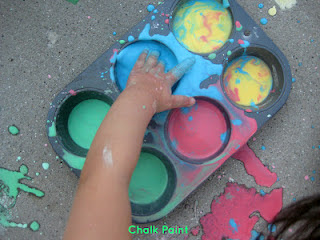This article has helped me to deeper understand how creativity can help young children develop in many different ways.
http://www.loveplayandlearn.com/2012/07/the-importance-of-creativity-and-how-to-foster-it.html
http://www.loveplayandlearn.com/2012/07/the-importance-of-creativity-and-how-to-foster-it.html
Creativity
should not be underestimated. Creativity helps teach cognitive skills
such as mathematics and scientific thinking. Creative thinking involves
imagination, basic use of the scientific method, communication, physical
dexterity and exertion, problem posing, problem solving, making
interpretations, and using symbols which help with future literacy
skills.
1-Creativity promotes emotional development-Creative
expression provides many opportunities for expressing emotions and
working through those emotions to gain relief and understanding of them.
To help your child do this you could encourage a child who is angry to
draw or paint a picture of how they are feeling. You could play varied
types of music that invoke different emotions and then ask your child
how the music makes them feel.
2-Creativity promotes social development-
In young childhood, creativity is often a social act. Singing, dancing,
puppetry, and theater all teach the child to pay attention to others as
well as develop an understanding of social rules like give and take,
and cooperation. Have a dance party with other children or have the
child and their friends put on a play or puppet show.
3-Creativity supports physical development-Working with art materials such as crayons, scissors, paint brushes, play dough and paint
promote fine motor skills and eye-hand coordination. To promote gross
motor skills try dancing, mural painting, theater, or large construction
projects like building things with boxes.
4-Creativity supports language and literacy development-By engaging in creative play or projects,
children
can learn new vocabulary words as well as learn to associate pictures
with words. As mentioned above try playing different kinds of music and
creating a conversation with the child about how it makes them feel;
this will boost language expression and understanding. Expose your child
to plenty of instruments and talk to them about their favorite one and
what sound each instrument makes. Ask them open ended questions about
their art work such as “how did you feel when you drew this” or “how
does this painting make you feel?”
5-Creativity promotes cognitive development- Creative
activities help children to develop attention skills and cognitive
learning. Their imagination is in full use and it encourages them to
come up with new ideas and to think outside of the box since creativity
involves exploration and problem solving. Through creative activities
such as playing with play dough,
children can learn pre-math skills such as the concept of less and
more. When children match shapes or colors in their creations they are
learning the math skill one to one correspondence. Creative
activities can help them learn about grouping and classification,
physical properties of objects, and cause and effect. Painting and play
dough are all great ways to explore these concepts.
There are four components of creativity as described by Psychologist Ellis P. Torrance: fluency, flexibility, originality, and elaboration.
Fluency is
the ability to produce a number of different ideas. To promote fluency
provide children with plenty of opportunities that stimulate the thought
process. Ask open ended questions and questions that ask the child’s
opinion. Encourage the child to explore and experiment and this will
enhance cognitive growth.
Flexibility is the ability to approach different situations and develop solutions from a number of different perspectives. Foster flexibility by allowing plenty of opportunities to explore and experiment. Allowing children to experiment and make mistakes unleashes their creative thinking and a sense of wonder. They feel free to imagine, invent, create, and try out new ways to do things. Asking questions during an activity or when a problem arises such as “how is another way we could do this or solve it?” encourages children to think outside of the box.
Originality is the ability to have a new or novel idea. To promote originality, provide a variety of supplies and experiences in which children can use their imagination and create. By painting or constructing something out of play dough they are creating something out of nothing.
Elaboration is the ability to extend ideas. Give children new ways of doing old ideas and activities. For instance, providing pipe cleaner and other items to stick into play dough would allow children to elaborate in their play.






No comments:
Post a Comment